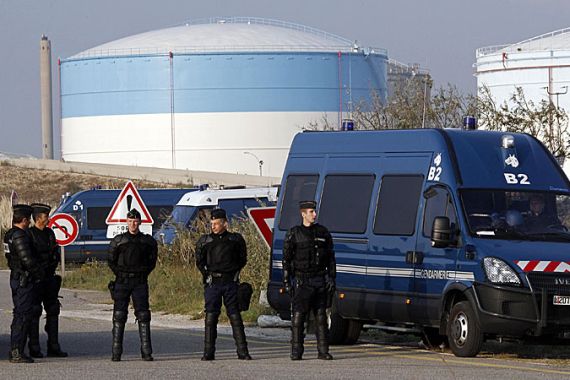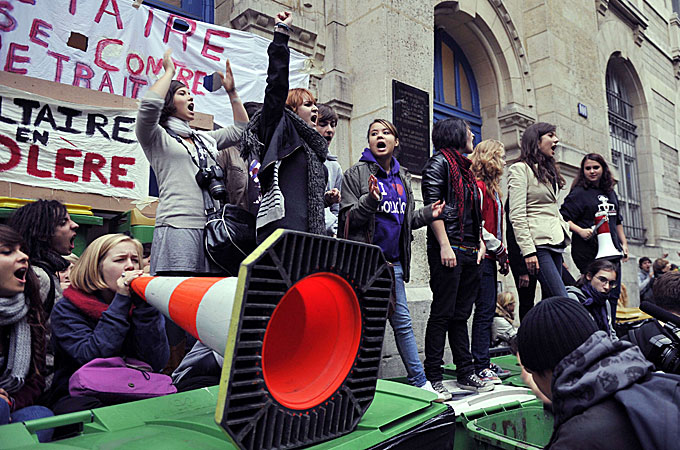French strikes threaten fuel supply
Police move to re-open refineries amid fears that action over pension reform could paralyse the nation’s fuel supplies.

 |
| High school students are also continuing to protest against the government’s pension reform plans [AFP] |
French police have been sent in to restore access to oil refineries blockaded by striking workers, whose protests have threatened fuel shortages across the country.
Authorities re-opened three depots on Friday morning in an attempt to ease disruption, after the nation’s 12 French oil refineries went on strike.
Keep reading
list of 4 itemsWhy is Germany maintaining economic ties with China?
Behind India’s Manipur conflict: A tale of drugs, armed groups and politics
China’s economy beats expectations, growing 5.3 percent in first quarter
But ousted strikers moved their picket lines to other distribution centres as the fight against government plans to raise the retirement age from 60 to 62 continued.
The action comes a day after the government attempted to calm fears of fuel shortages, amid reports of panic buying after eight refineries shut down operations on Thursday.
Fresh protests urged
Dominique Bussereau, the French transport minister, authorised oil companies to use some of their reserves after trucking companies complained of difficulties fuelling their vehicles.
But he said there was no reason for drivers to fear a shortage.
Workers at all 12 plants went on strike Friday after others owned by Exxon Mobil and Petroplus voted to join the walkout, a union co-ordinator has said.
Police managed to re-open a depot near the southern port city of Marseille and removed blockades at another near the south-western city of Bordeaux, and at a third site near Clermont-Ferrand.
But strikers threw up fresh pickets in at least five other fuel depots.
Unions have also called for a fresh day of strikes and protests on October 19, on the eve of a Senate vote on a bill to raise the retirement age.
Call for intervention
Refiners’ group, Union Francaise des Industries Petrolieres [UFIP] has urged authorities to intervene, calling on Thursday for strategic stocks to be used.
A spokesperson for International Energy Agency said: “While France has not drawn down emergency stocks in response to this situation, stocks held for emergency purposes have been utilised in a technique referred to as ‘re- localisation’.
“Reserves in the needed area are swapped with commercial stocks held elsewhere in France such that the total emergency reserves do not change.”
France’s strategic fuel reserves, representing three months’ supply, were last used in 2005 after Hurricane Katrina in the United States disrupted international supply.
Massive protests over the government’s pension plans have escalated this week, with a nationwide day of strikes and demonstrations on Tuesday bringing at least one million people onto the streets.
Student protests
Some workers have continued to stage walkouts, while high school students are also continuing to demonstrate in several cities.
Pupils threw stones at police at two schools north of Paris on Thursday and officers clashed with youths and made arrests in the northern city of Lens.
On Friday more than 300 schools were affected by student protests, officials said, and in the Riviera city of Cannes, a police officer was injured by a stone thrown during a student protest.
“There have never since 1995 been as many protesters … from both the public and private sectors, and now from all generations,” Bernard Thibault, the head of the powerful CGT union, told LCI
television.
In 1995 then president Jacques Chirac backed down over pension reform after a three-week transport strike paralysed France.
But despite the ongoing strikes and protests, the current government shows no sign of backing down.
Key parts of the reform, part of efforts to rein in France’s public deficit, have been definitively passed by the upper house and the government hopes for it to be passed in its entirety by the end of the month.
Unions and the Socialist opposition say Nicolas Sarkozy, the president, is making workers pay an unfair share of the bill for the financial crisis and have made alternative proposals for funding the deficit.